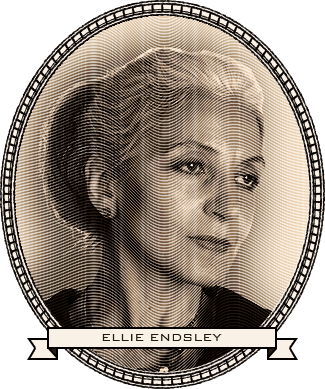January 29th, 2014
Episode 2: Ellie Endsley
Ellie Endsley’s warm smile comforts the nervous young intern candidate.
“I am grateful that we had this opportunity to meet and visit, Ms. Tyler,” Endsley says. The girl, who is not sure whether to say ‘thank you’ or ‘you’re welcome,’ stands quickly and extends her hand.
Endsley also stands, with the help of a cane. A hint of pain momentarily crosses her face. She shakes her guest’s hand warmly, promising that she will follow-up soon.
By any measurement, the interview has been a disaster, but the graceful Endsley appears unaffected by the girl’s anxious, uncomfortable performance. As she often does when she meets new people, Endsley holds the girl’s hand a second longer than is customary, to gauge her reaction.
Endsley has been relying on free help ever since she founded her not-for-profit, Independents Can. And she has learned to take the bad with the good. She nods a farewell when she finally releases the girl’s hand, making a mental note of her initial assessment: Ms. Tyler is more good than bad, and worthy of a second look.
An aid appears, unbidden, and leads the girl out of Endsley’s small office. They pass through the cramped war room where the two paid staff members and a gaggle of interns and volunteers are excitedly congregating around a motley collection of monitors. Ms. Tyler exits through the building’s dingy lobby along Neches Street.
Endsley types a note in the girl’s file: “Proactively moved the meeting toward closure when she had nothing left to offer. Not afraid to accommodate a client’s idiosyncrasies.”
After closing the girl’s file, Endsley quickly reviews the reports from her monitors, none of which contain new information about James Carlos Cates.
She turns her chair toward the window and leans back.
Why are there no reports that Cates has filed his intent to run? He had been threatening to do so for weeks, and today is the deadline. Endsley glances at her watch, a cheap Timex with a worn red leather strap. He still has eight hours to beat the clock.
She is paying too much attention to Cates; she knows that. Yes, he would be a good candidate. Yes, he has money and strong ties to the business community. Yes, he had successfully campaigned for and served in public office. And perhaps most importantly, while he said he would run as an independent, he had personal and family ties to the Democrats, whom he would need to win. After all, none of them can do it all alone.
Endsley started following Cates’ career after seeing him engage in a series of right-to-life debates in which Cates called on the group to make a distinction between protecting the unborn and allowing an adult to make decisions about the cessation of his or her own life.
While he hadn’t swayed the group to support his position favoring a human’s right to doctor assisted euthanasia, he had won Endsley’s attention with his unique, pro-life position. Adults can and should control their own destiny — the unborn cannot, Cates argued.
Endsley had grown up in a family that was aggressively pro-life. Her parents donated their time and money to the pro-life movement and taught their children that their mission was akin to being super-heroes. “After all,” her father had said during one of the many family discussions around the kitchen table, “super-heroes and those who advocate for the unborn have the same mission: to protect those who cannot protect themselves.”
“So what?” Endsley asks herself, frustrated that she can not put Cates out of her mind.
Is he really any different from other candidates who had filed their intent to run as independents? This was not the first time an attractive candidate had intrigued her. She had been burned before, and it would undoubtedly happen again. She is bigger than that now, she reminds herself; her organization is bigger than one candidate.
As she stares out the window, Endsley knows she should be calling the candidates who had filed their intent to run that morning. She should be offering her assistance, while gathering intelligence on them from her sources across the state. She has a million things to do, yet she is daydreaming about a man she has never met.
What about the fact that Cates has publically denounced the Speaker? Yes, Endsley does it too, but she knows what she is doing. She knows when to prod and when to relent. Does Cates’ know? Is he just an angry bull who will stamp about until someone with experience cuts him? Will he relentlessly kick and spin, falling exhausted long before the end of the fight? Or, worse still, will he lose his interest when the Speaker appears to ignore him? Because that is what the Speaker will do, of course; he will ignore Cates.
The Speaker will be watching, yes. And Carol King will be watching. And Gonzo will be watching. Ah, Gonzo! What secrets will you whisper in my ear to undermine Cates, Endsley wonders. Everyone on the Speaker’s team will be watching, but none of them will address Cates publically, at least not in the beginning.
As Endsley sits obsessing – unproductively obsessing – Ms. Tyler, the intern candidate, walks by the window through which Endsley is staring.
Endsley smiles and sits forward, delighted by the distraction and the opportunity to get a candid look at the girl.
The young Ms. Tyler is walking toward 8th Street, typing furiously on her mobile with each step, unaware that she is being watched. She fails to see a wet mound of fresh dog feces on the sidewalk. She curses loudly when she realizes that she has stepped in it. Then, in a wholly ungracious manner, she begins furiously scraping her shoe on the curb.
Endsley sits back suddenly, surprised by the girl’s excessive reaction. She frowns with disappointment. How can I trust someone who hasn’t the sense to look up now and again to see where she’s headed? Isn’t success gauged by how skillfully we dodge the big piles of shit that life constantly drops in front of us?
Shaking her head, she reopens the girl’s file, and types in another, final note. Then, setting aside her thoughts about Cates (and that big bear, Gonzo), she turns her attention to her team, who are still huddled in small groups throughout the war room, talking excitedly about something on the monitors.
Endsley adjusts the delicate gray scarf tied around her neck, and stands with the help of her cane. Once again, pain flashes across her face, as if some impingement restricts her movement. She slowly takes in a deep breath and exhales through her mouth, reminding herself that this is her life – right here, right now, pain and all.
The monitors in the war room display non-stop streams of data related to her organization’s efforts to promote and support the success of independent candidates and issues. Among these data streams and reports are live feeds of the organization’s field operatives, all volunteers, who are currently demonstrating in three locations across the state.
The war room’s attention is focused on a live feed from the western edge of the Capitol lawn, where one of their ground teams has been mobilized outside of Speaker Garza’s offices.
Endsley notices that her ground team is no longer demonstrating, but using mobiles to gather one-on-one interviews. Something has happened. She hasn’t seen the footage, yet, but Endsley can tell from the energetic activity around her that they have captured a conflict – the golden ticket for a low budget operation like Independents Can.
Endsley finds an open monitor and calls up recent footage from the live feed.
Her ground team had been picketing against the Speaker, accusing him, under the coordination of Carol King, of conspiring with the tourism industry to continue thwarting changes to the length of the school year — an education reform initiative that had been bottled up for decades. It was an old issue, but a new argument, and Endsley had recently introduced it into the rotation. She was surprised to see it working so well so quickly.
In the footage she sees that several people have stopped to listen to the demonstrators. When her team accuses the Republicans and the Democrats of being equally responsible for the state’s education reform morass, two people from the crowd – probably eager Capitol staffers – become incensed by the accusations and get caught up in the debate.
Endsley doesn’t recognize them, though she quickly sees that they reflect opposing allegiances. They appear equally enraged by the implication that their party was responsible for the state’s embarrassingly low performing public school system.
The woman shouts out that Republicans are to blame, saying that all they care about is making money for their crooked friends and contributors. A nearby man replies with vehemence:
“Crooked?!? Crooked?!?,” he bellows. “Do you know why you Democrats have been so slow to win back seats that should have been yours by default?”
The woman responds, but Endsley can not make out her words. She replays the comment twice, but it is lost to her. She resumes the video and the man is still yelling:
“South Texas politics, that’s why! People in the northern half of the state look at the D’s who get elected, and we know that some of those candidates are buying votes. Who wants to sign up for that? Crooked?!? Crooked?!? How dare you? Even your own people don’t have the strength to fight a system like that.”
Endsley stops the recording. She did not need to see any more. She knew what had happened, what was happening, and what needed to happen. It was an ugly discussion, but it was a conflict, and that’s what they were fishing for, not a quality debate.
As soon as the argument began, her war room team immediately shared and promoted the argument, using it – as they had been trained to do – to establish the organization’s position as a thought leader on independent issues, and to spread their brand name, which is critical to their fundraising and grassroots efforts.
Endsley doesn’t need to waste time listening to every detail of the debate, nor is it necessary to review her team’s efforts to promote it. Her responsibility is to keep the machine moving.
Endsley scans the room. Her mismatched, inexperienced team collaborates, argues, and struggles to engage in discussions on dozens of social media platforms. Some will prepare sound bites and summaries to share with traditional media, and edit commentary into the video captured at the event – all of which they will promote through public and private channels this afternoon and well into the night.
It is not easy work. Her team is made up of people who are either very young or very old. Nearly all of them are unpaid. They are being asked to accomplish goals that larger, better-funded organizations pay teams of experienced people big bucks to tackle.
But Endsley is a master at making something out of nothing. She knows that the key to winning is to do her best, equip good people with effective tools, and be flexible about her definition of success.
She walks calmly around the room and smiles at the volunteers. She offers gentle, enthusiastic encouragement. She shouts her approval when someone makes an especially strong comment, or figures out a clever way to boil the argument down to a few words. And she is constantly touching the people she passes – gently, respectfully – she touches as many of them as she can, especially when she sees signs of stress and fear.
“Speed is not your friend,” she gently reminds the team. “We have so little time; we must proceed very slowly.”
When Endsley is sure that everyone is pulling in the same direction, she stops at a vacant monitor and pulls up her personal portal. There is no new information about Cates.
On any other day, when her tactics had worked and she had managed to create and capture a conflict, it would have thrilled her to have the opportunity to be documented as an expert and share her opinions. She knows that is the key growing her brand, further establishing her credibility, and advancing a cause she believes in. But she it is not yet thrilled. On this day, that is not enough. She can’t stop thinking about James Carlos Cates.
If she were meeting with her counselor, he would suggest that she was obsessed with Cates. He would challenge her to consider the value (and the cost) of obsessing over something beyond her control.
But she has come to trust her instincts more with each passing year. Her instincts are telling her that if Cates runs, there may be some dramatic changes in store. She is excited by that possibility.
Of course, who would change, and how, are questions that her instincts leave unanswered.
Endsley feels fear – just a little – mixed up with all of that excitement.













Comments
COMMENT POLICY
The Independent Candidate is pleased to include your comments and observations about this story. We encourage lively debate on the issues of the day, but we ask that you refrain from using profanity or other offensive speech, engaging in personal attacks or name-calling, or posting advertising. To comment, you must be a registered user of The Independent Candidate, and your user name will be displayed. Thank you for sharing your thoughts. We're here to serve.
You must be logged in to leave a comment.
Login | Register